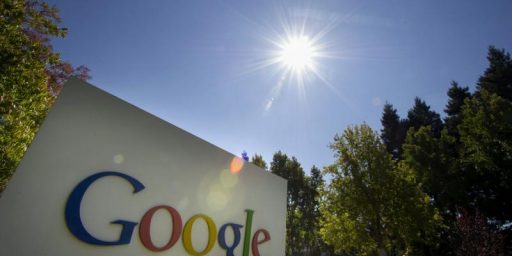Google PCs Coming Soon?
Paul Boutin believes that access-anywhere networked PCs, with most of the cool features of YouOS but backed by the multi-billion dollar Google bankroll, will be with us soon. As the article’s tagline suggests, “It’s coming. It’ll be great. You’ll hate it.”
Instead of trying to convince every consumer on the planet to buy a new machine, it makes a lot more sense for Google to build a super-service that you could log into from any computer, phone, or television, or car and airplane seatback. You would be able to access your files anywhere by logging in, calling up your desktop, and popping into Google’s array of Gmail-like applications for word processing, photo editing, and anything else you can think of.
[…]
A network-based PC could offer more file space, faster searches, guaranteed backups, cheaper software costs, login-from-anywhere portability, and far less home maintenance. Let’s skip ahead, though, to the most counterintuitive advantage: Dollar for dollar, network-based computers are faster.
Unless you’re playing Grand Theft Auto or watching HDTV, your network isn’t the slowest part of your setup. It’s the consumer-grade Pentium and disk drive on your Dell, and the wimpy home data bus that connects them. Home computers are marketed with slogans like “Ultimate Performance,” but the truth is they’re engineered to run cool, quiet, and slow compared to commercial servers. Google’s Web search is blindingly fast because your requests get handled by a sprawling array of loud, hot, power-hungry server racks that you’d never allow in your house. All your home computer has to do is draw the results of Google’s massive data-mining process on its screen—that’s the easy part.
The same division of labor applies to Gmail, Google Maps, and most of Google’s slowly but surely growing list of applications. Even graphics-intensive programs like CAD software and photo editing tools can be made to run quickly over a network connection if you optimize them properly.
Still, as Boutin notes, there’s going to be a lot of resistance. “No matter how snazzy Google’s online services, people will want to store their files at home.” Still, while that urge exists, people may well let go. Many of us have already turned our email over to Google and/or Yahoo. Indeed, although I have an essentially unlimited number out @outsidethebeltway.com email accounts at my disposal, I haven’t bothered to use any of them in well over a year; it’s just radically more convenient to be able to keep my mail in one location, accessible from anywhere.
This is more problematic:
But the real deal-breaker is trust: Are you going to let someone else handle all your data? If you use a Google-served computing environment, everything you upload, download, or type potentially passes through Google’s computers. I’ll be the first to sign up, but that’s my blind faith in statistics. If there’s a privacy breach at Google, I figure I’ll be about 10 millionth in line to get hurt. How about it: Would you trust Google to protect your e-mail, your tax documents, and your family photos?
As I’ve already noted, the answer is Yes on my email. Probably my tax documents, too, for that matter; there are backups for all that stuff. The photos might be more problematic. Then again, I’ve already got a PC that I could store the photos on.






I don’t think the platform will be a PC. More like a cell phone or PDA type of device that can wireless access the data. Use removable flash memory like SD cards and such for your own data that you need to keep on hand. Maybe a USB interface to link up with your PC.
If this article is correct, then do the Net Neutrality opponents have a point about Google getting a free ride?
Here, quite clearly, is a person who has never been in my house.
(Chuckle)
People have been pushing some variation of this notion for over a decade. I expect to have a flying car in my garage first.
…and considering right now I can’t even get a regular car in my garage…
Although, come to think of it, if Google could come up with a way to store online all the crap that’s in my garage, they just might get a customer.
McGehee,
I think that the transporter system ala Star Trek will be delivered a bit behind your flying car. Until then, there is a company that will bring a cargo container to your driveway. They will even help hook you up with some men to move the stuff between the garage and the container. They will then take the container away, store it and bring it back as many times as you are willing to pay for it. They will even do multiple containers. So what you want is available today. The real questions are 1) are you willing to pay for it, 2) will the transport delay be to slow for you and 3) what are you thinking about keeping all that junk in your garage.
This will come about, just like the NetworkPC did about 10yrs ago, right?
When everyone wanted fancy terminals at their desktop and bringing down the network speed by running software over the company network (ie try having 200 people operating MS Word over, at the time 100mb network off 2-3 servers, yeah right).
Are they just assuming that everyone lives with DSL/Cable modems? I guess normal dial-ups shall be left behind then.
Scott T,
If you look at the broadband rates of adoption, dial up is going the way of the video cassette. It may be a while before it is totally gone, but its fading fast.
As more and more of us strike out on our own in small businesses, the merger of our business lives, PCs, and networks with our personal lives gets ever more comingled. It will be a very, very cold day in San Jose before I trust my business data to the “trust me” promises of Google.